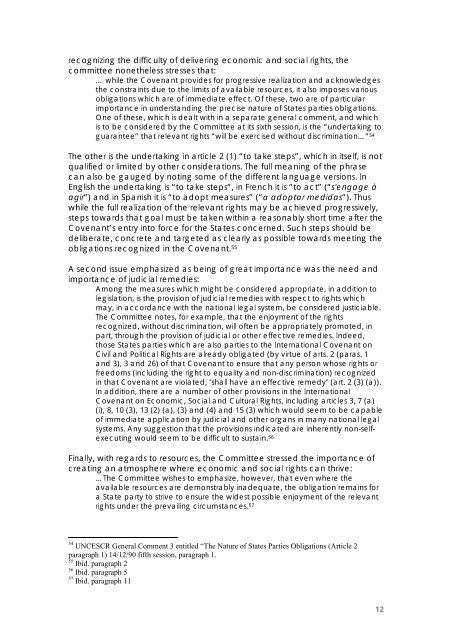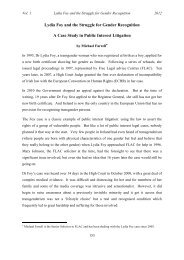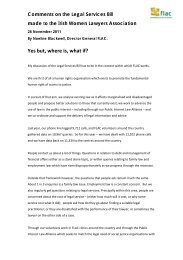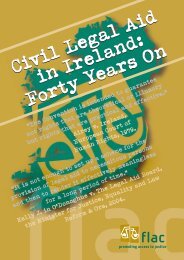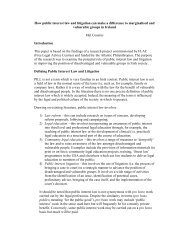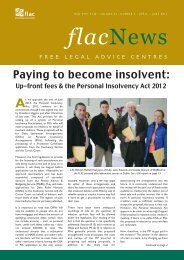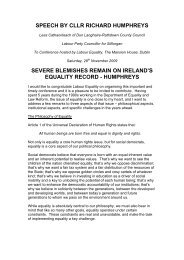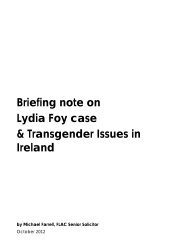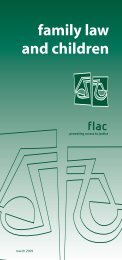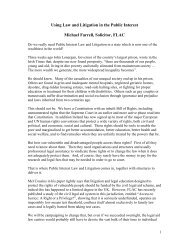Public Interest Litigation as a Tool for Vulnerable Groups: Lessons ...
Public Interest Litigation as a Tool for Vulnerable Groups: Lessons ...
Public Interest Litigation as a Tool for Vulnerable Groups: Lessons ...
Create successful ePaper yourself
Turn your PDF publications into a flip-book with our unique Google optimized e-Paper software.
ecognizing the difficulty of delivering economic and social rights, thecommittee nonetheless stresses that:… while the Covenant provides <strong>for</strong> progressive realization and acknowledgesthe constraints due to the limits of available resources, it also imposes variousobligations which are of immediate effect. Of these, two are of particularimportance in understanding the precise nature of States parties obligations.One of these, which is dealt with in a separate general comment, and whichis to be considered by the Committee at its sixth session, is the “undertaking toguarantee” that relevant rights “will be exercised without discrimination…” 54The other is the undertaking in article 2 (1) “to take steps”, which in itself, is notqualified or limited by other considerations. The full meaning of the phr<strong>as</strong>ecan also be gauged by noting some of the different language versions. InEnglish the undertaking is “to take steps”, in French it is “to act” (“s'engage àagir”) and in Spanish it is “to adopt me<strong>as</strong>ures” (“a adoptar medid<strong>as</strong>”). Thuswhile the full realization of the relevant rights may be achieved progressively,steps towards that goal must be taken within a re<strong>as</strong>onably short time after theCovenant’s entry into <strong>for</strong>ce <strong>for</strong> the States concerned. Such steps should bedeliberate, concrete and targeted <strong>as</strong> clearly <strong>as</strong> possible towards meeting theobligations recognized in the Covenant. 55A second issue emph<strong>as</strong>ized <strong>as</strong> being of great importance w<strong>as</strong> the need andimportance of judicial remedies:Among the me<strong>as</strong>ures which might be considered appropriate, in addition tolegislation, is the provision of judicial remedies with respect to rights whichmay, in accordance with the national legal system, be considered justiciable.The Committee notes, <strong>for</strong> example, that the enjoyment of the rightsrecognized, without discrimination, will often be appropriately promoted, inpart, through the provision of judicial or other effective remedies. Indeed,those States parties which are also parties to the International Covenant onCivil and Political Rights are already obligated (by virtue of arts. 2 (par<strong>as</strong>. 1and 3), 3 and 26) of that Covenant to ensure that any person whose rights orfreedoms (including the right to equality and non-discrimination) recognizedin that Covenant are violated, "shall have an effective remedy" (art. 2 (3) (a)).In addition, there are a number of other provisions in the InternationalCovenant on Economic, Social and Cultural Rights, including articles 3, 7 (a)(i), 8, 10 (3), 13 (2) (a), (3) and (4) and 15 (3) which would seem to be capableof immediate application by judicial and other organs in many national legalsystems. Any suggestion that the provisions indicated are inherently non-selfexecutingwould seem to be difficult to sustain. 56Finally, with regards to resources, the Committee stressed the importance ofcreating an atmosphere where economic and social rights can thrive:…The Committee wishes to emph<strong>as</strong>ize, however, that even where theavailable resources are demonstrably inadequate, the obligation remains <strong>for</strong>a State party to strive to ensure the widest possible enjoyment of the relevantrights under the prevailing circumstances. 5754 UNCESCR General Comment 3 entitled “The Nature of States Parties Obligations (Article 2paragraph 1) 14/12/90 fifth session, paragraph 1.55 Ibid. paragraph 256 Ibid. paragraph 557 Ibid. paragraph 1112


